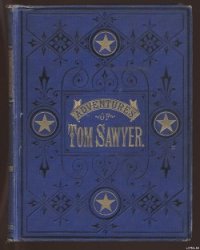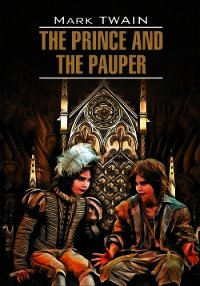Английский язык с Марком Твеном. Принц и нищий (Mark Twain. The Prince and the Pauper) - Twain Mark (читать хорошую книгу полностью .txt) 📗
The advance-guard of the expected procession (авангард ожидаемой процессии) now appeared in the great gateway (теперь показался в больших воротах), a troop of halberdiers (группа алебардщиков). They were dressed in striped hose (они были одеты в полосатые штаны) of black and tawny (черного и рыжевато-коричневого цвета), velvet caps graced at the sides with silver roses (бархатные шапочки, украшенные по бокам серебряными розами), and doublets of murrey and blue cloth (и камзолы из багровой и голубой ткани), embroidered on the front and back with the three feathers (украшенными спереди и сзади тремя перьями), the prince's blazon (гербом принца), woven in gold (вытканным золотом; to weave — ткать). Their halberd staves (древки их алебард) were covered with crimson velvet (были покрыты малиновым бархатом), fastened with gilt nails (прибитым золочеными гвоздиками), and ornamented with gold tassels (украшены золотыми кистями). Filing off on the right and left (выстраиваясь справа и слева), they formed two long lines (они образовали две длинные шеренги), extending from the gateway of the palace to the water's edge (тянущиеся от ворот дворца к кромке воды; edge — край). A thick, rayed cloth or carpet (толстая, с узором в виде расходящихся лучей, ткань или ковер; ray — луч) was then unfolded (была затем развернута), and laid down between them by attendants in the gold-and-crimson liveries of the prince (и положена между ними слугами в золото-малиновых ливреях принца; to lay down — класть вниз). This done (это сделано = когда это было сделано), a flourish of trumpets resounded from within (звуи фанфар прогремели изнутри; trumpet — труба /муз./). A lively prelude arose from the musicians on the water (оживленная прелюдия донеслась от музыкантов на воде); and two ushers with white wands (и два церемониймейстера с белыми жезлами) marched with a slow and stately pace (прошагали медленной и статной походкой) from the portal (от главных ворот). They were followed (за ними следовал; to follow — следовать) by an officer bearing the civic mace (офицер, несущий гражданский жезл), after whom came another carrying the city's sword (за которым шел другой, неся меч города); then several sergeants of the city guard (затем несколько сержантов городской стражи), in their full accoutrements (в своем полном снаряжении), and with badges on their sleeves (и с эмблемами на рукавах); then the Garter king-at-arms (зате герольдмейстер ордена Подвязки), in his tabard (в камзоле герольда; tabard — плащ, носимый рыцарями поверх лат; амзол герольда); then several knights of the Bath (затем несколько рыцарей ордена Бани), each with a white lace (каждый с белым кружевом) on his sleeve (на своем рукаве); then their esquires (затем их оруженосцы); then the judges (затем судьи), in their robes of scarlet and coifs (в своих мантиях алого цвета и шапочках); then the Lord High Chancellor of England (затем лорд-канцлер Англии), in a robe of scarlet, open before (в одеянии алого цвета, открытом спереди), and purfled with minever (и отороченном горностаем); then a deputation of aldermen (затем делегация олдерменов /членов городского правления/), in their scarlet cloaks (в своих алых мантиях); and then the heads of the different civic companies (а затем — главы различных гражданских компаний), in their robes of state (в своих парадных одеждах). Now came twelve French gentlemen (затем шли двенадцать французских джентльменов), in splendid habiliments (в прелестных одеяниях), consisting of pourpoints of white damask (состоящих из стеганых камзолов белого дамаска) barred with gold (обитого золотом), short mantles of crimson velvet (в коротких мантиях из малинового бархата) lined with violet taffeta (украшенных лиловой тафтой), and carnation-colored hauts-de-chausses (и широких штанах до колен, покрашенных в цвет гвоздики; carnation — гвоздика), and took their way down the steps (и спустились по лестнице). They were of the suite of the French ambassador (они были из свиты Французского посла), and were followed by twelve cavaliers (и за ними шли двенадцать кавалеров) of the suite of the Spanish ambassador (из свиты испанского посланника), clothed in black velvet (одетые в черный бархат), unrelieved by any ornament (нерасцвеченный какими-либо украшениями; to relieve — облегчать). Following these came several great English nobles with their attendants (вслед за этим прошли несколько великих английских дворян со своими слугами).'
crimson [`kr?mz?n], resound [r?`zaund], carnation [ka:`ne?S(?)n]
The advance-guard of the expected procession now appeared in the great gateway, a troop of halberdiers. 'They were dressed in striped hose of black and tawny, velvet caps graced at the sides with silver roses, and doublets of murrey and blue cloth, embroidered on the front and back with the three feathers, the prince's blazon, woven in gold. Their halberd staves were covered with crimson velvet, fastened with gilt nails, and ornamented with gold tassels. Filing off on the right and left, they formed two long lines, extending from the gateway of the palace to the water's edge. A thick, rayed cloth or carpet was then unfolded, and laid down between them by attendants in the gold-and-crimson liveries of the prince. This done, a flourish of trumpets resounded from within. A lively prelude arose from the musicians on the water; and two ushers with white wands marched with a slow and stately pace from the portal. They were followed by an officer bearing the civic mace, after whom came another carrying the city's sword; then several sergeants of the city guard, in their full accoutrements, and with badges on their sleeves; then the Garter king-at-arms, in his tabard; then several knights of the Bath, each with a white lace on his sleeve; then their esquires; then the judges, in their robes of scarlet and coifs; then the Lord High Chancellor of England, in a robe of scarlet, open before, and purfled with minever; then a deputation of aldermen, in their scarlet cloaks; and then the heads of the different civic companies, in their robes of state. Now came twelve French gentlemen, in splendid habiliments, consisting of pourpoints of white damask barred with gold, short mantles of crimson velvet lined with violet taffeta, and carnation-colored hauts-de-chausses, and took their way down the steps. They were of the suite of the French ambassador, and were followed by twelve cavaliers of the suite of the Spanish ambassador, clothed in black velvet, unrelieved by any ornament. Following these came several great English nobles with their attendants.'
There was a flourish of trumpets within (раздался грохот фанфар внутри); and the prince's uncle (и дядя принца), the future great Duke of Somerset (будущий великий герцог Сомерсетский), emerged from the gateway (появился из ворот), arrayed in a doublet of black cloth-of-gold (наряженный в камзол из черной золотой парчи), and a cloak of crimson satin flowered with gold (и в плащ из малинового атласа, расцвеченного золотом), and ribanded with nets of silver (и затканный сетками серебра). He turned, doffed his plumed cap (он повернулся, снял свою шапочку с перьями; plume — перо), bent his body in a low reverence (согнул тело в низком поклоне), and began to step backward (и начал шагать назад; to begin — начинать(ся)), bowing at each step (кланяясь при каждом шаге). A prolonged trumpet-blast followed (продолжительный грохот труб последовал), and a proclamation (и воззвание), 'Way for the high and mighty (дорогу высокому и могущественному), the Lord Edward (лорду Эдварду), Prince of Wales (принцу Уэльскому)! High aloft on the palace walls (высоко вверху на стенах дворца) a long line of red tongues of flame (длинная череда красных языков пламени) leaped forth (прыгнула вперед) with a thunder-crash (с грохотом грома); the massed world on the river (собравшийся мир = люди на реке) burst into a mighty roar of welcome (взорвался могучим ревом приветствия; to burst — взрываться); and Tom Canty (и Том Кэнти), the cause and hero of it all (причина и герой всего этого), stepped into view (появился: «выступил в видимость»; view — предел видимости, взгляд), and slightly bowed his princely head (и слегка склонил свою царственную голову).




